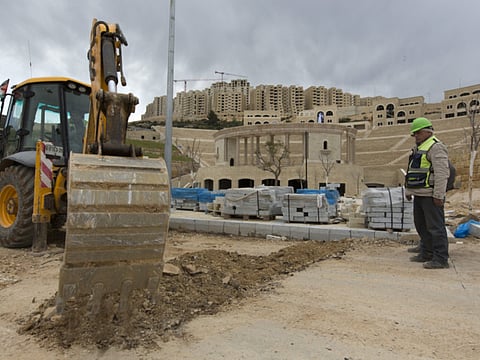Palestinian housing project waits for water
Entrepreneur Bashar Masri has lost $25m in revenue due to Israeli regime’s manoeuvring

Rawabi, West Bank: The billion-dollar, five-year gamble to build a new middle-class Palestinian city on a West Bank mountaintop was just about to welcome its first residents when the Israeli regime decided last month to withhold a basic necessity: running water.
Before granting water access to the planned city of Rawabi, the Israel regime — which controls the area that the water pipe would run through — wants Palestinian National Authority (PNA) officials to return to an Israeli-Palestinian Joint Water Committee. The Palestinians abandoned the group in 2010 because they don’t want to approve water projects to illegal Jewish colonies in the occupied West Bank, which are built on land that Palestinians want for a future state — and which still get plenty of water.
The man-made water crisis at Rawabi represents a blow to the middle-class Palestinian community, which hoped to enjoy the city’s outdoor mall, restaurants, boutiques, sports club, swimming pool, multiplex theatre and school system.
Builders were ready to hand over the keys to 450 buyers almost a year ago, when the permission to turn on the tap was withheld, a delay they thought would be temporary but now appears indefinite. But the finished apartments remain vacant, and a 12,000-seat Romanesque amphitheatre sits empty; a downsized construction crew works on a slashed budget.
Bashar Masri, the Palestinian-American entrepreneur behind Rawabi, says he has lost $25 million (Dh91.80 million) in revenue because of the delay, with an additional $75 million in payments frozen until he delivers the homes.
The project received hundreds of millions of dollars in Qatari financing, but now Masri said he is dipping into his own assets and slashing production, laying off 2,000 construction workers, engineers and office employees.
“We’re on the verge of bankruptcy,” Masri said in an interview at his office in Rawabi. “It has permanently devastated the project financially.”
The water hold-up is a high-profile setback for the biggest and, some say, most hopeful development project in the West Bank. Thousands of visitors — including UN Secretary-General Ban Ki-moon and US Secretary of State John F. Kerry — have visited over the years to see Masri unveil each phase for what Time magazine called “a shining city on a hill.”
The project has received $5 million from the US Agency for International Development for roads and retaining walls.
But criticism is now coming from both Palestinians and Israelis.
“There is no way to explain why Israel is withholding water,” said an opinion piece in Israel’s largest-circulation daily newspaper, Yedioth Ahronoth.
Rawabi “is a bourgeois, well-kept, demilitarised island, free of politics,” it said.
Israeli President Reuven Rivlin urged Israeli officials to turn on the tap. “We should be assisting them in the provision of water,” Rivlin said last week at a democracy conference in Tel Aviv. “Don’t we give water to the settlements [colonies]?”
Rivlin, who in the past has opposed the creation of a sovereign Palestinian state, added that “Rawabi is in the interest of Israel.”
The Rawabi water spat seemed to be resolved in late January, when Israeli Maj. Gen. Yoav Mordechai, the Israeli Coordinator of Government Activities in the Territories, sent Masri a letter saying he had approved the water hook-up, a spokeswoman for the general said.
But the implementation has been halted by Silvan Shalom, the Israeli Minister of National Infrastructures, Energy, and Water Resources, a lawmaker who has come under pressure from right-wing pro-colonist activists who oppose Rawabi.
“The Palestinians don’t recognise the colonies,” said Ehab Barghouti, the senior adviser to the Palestinian water minister. He said that new water projects to Jewish colonies are not impeded by the absence of the committee, which was set up in 1995 as part of the Oslo peace accords.
“They’re under the false impression that if the Palestinians approve settlement [colony] projects, we will give them some kind of legitimacy,” Barghouti said of the Israelis.
The United Nations and most foreign governments consider the colonies a violation of international law. The United States calls the colonies “illegitimate” and their continued construction an obstacle to peace. The Israelis dispute this and say they have a right to build in the West Bank.
One of Rawabi’s Palestinian buyers, Amal Kaabi, 43, a Ramallah insurance agent, said she and her husband have made plans twice to move to Rawabi with their four children.
“They’re trying to play tough, but in the end it will be okay,” she said. “It’s a beautiful new city, and it will make the Israelis jealous of us.”
Masri, a Virginia Tech graduate, lived for 25 years in the Washington area, where he launched a career of building projects in Morocco, Jordan and Egypt. He began construction on Rawabi in 2010 when he was living in Ramallah.
“People thought we were dreaming,” Masri said.
Masri planned a secular city of 40,000 complete with 3,000 on-site jobs, including a high-tech centre where Palestinians would work remotely for firms such as Microsoft and Google.
“To most Palestinians, Rawabi is a symbol of hope and ability,” Masri said. “It’s about nation-building.”
When Mordechai approved the water connection in late January, Masri gleefully put the news on the cover of his development’s Rawabi Home magazine — “At Last, Water Problem Resolved” — and began to notify buyers of the 639 apartments that they were ready.
Masri flipped the pages on a recent day to the article: “Rawabi will soon come alive as hundreds of new families move into the homes of their long-delayed dreams,” it reads.
“We’re still optimistic, and determined,” he said. “Rawabi is here to stay.”
— Washington Post


